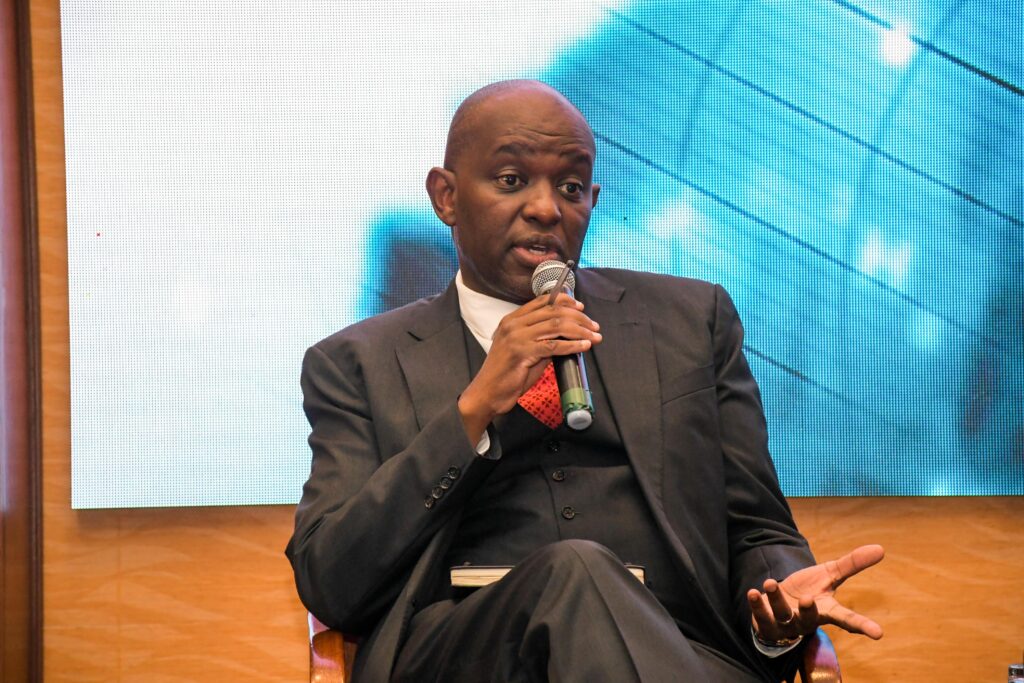
Mr.Einstein Kihanda CEO ICEA LION ASSET MANAGEMENT at Serena Hotel speaking to the Media when presenting the Q1 Economy Outlook ,2023[Photo/Source/B.Q}
The Kenya’s economy is expected to decline according to East Africa’s pioneering Investment Management Firm ICEA LION Asset Management presented in its Quarter 1 2023 Investor Pulse with the theme ‘Global downturn, local resilience’.
Speaking at the event, Judd Murigi, Head of Research at ICEA LION Asset Management highlighted the following:
Key Trends:
• Global downturn looming:Developed market economies are expected to slow down and even potentially go into recession in 2023 as a result of central bank rate hikes aimed at taming inflation, especially in the first half of the year. However, there may be some recovery in the US especially in the second half of 2023.

• Local upturn:In 2022, the crucial agriculture sector faced a second successive year of contraction due to the effects of the La Nina weather phenomenon that reports indicate may now be coming to an end.Non-recurrence of the drought and the general election that constrained growth in 2022 would give an uplift to a number of key economic sectors in 2023. Specifically, the agriculture, manufacturing, transport,
information/communication and financial services sectors are expected to rebound the most in 2023 in the absence of the factors like drought and elections that impacted growth in 2022. As such, we anticipate GDP growth in 2023 to approach or exceed 6% if normal or near-normal rainfall resume during the long rains season, and there are sufficient measures put in place in advance for the adverse impact of a potential El Nino season (which tends to follow La Nina) on harvests or access to markets.
Inflation to revert to within CBK’s target levels: Non-recurrence of drought would have a beneficial impact on food prices while the global economic slowdown should see a reduction in the price of oil. As such, headline inflation is expected to go below CBK’s target rate of 7.5% in the course of the year.
• Private sector credit growth to trend towards high double digits: Year-on-year private sector credit growth hit 13% in October 2022. The financial services sector experienced one of the sharpest slowdowns during the election period and is therefore expected to recover strongly in 2023. Private sector credit growth could approach the high double digits this year as banks resume lending to the real economy.
• Expect a more stable KES: The shilling depreciated by 8% in 2022 largely due to the strengthening of the US dollar as a result of interest rate hikes in the US. While the shilling may face further downward pressure in 1H23, it may fare better in the second half as the US dollar sheds some of the significant gains witnessed over the last 12 months

• Kenya not likely to default on debt repayment obligations if the government cuts costs and borrowing: Kenya faces considerable debt servicing pressures as a result of a higher debt burden.However, Kenya’s debt metrics are far better than those of debt defaulting countries such as Ghana and Zambia. As long as the government maintains measures to reduce the budget deficit and rein in additional borrowing, Kenya should be able to manage its debt burden in the near to medium term.
In closing, ICEA LION Asset Management CEO – Einstein Kihanda, who is also the current Chairman of the Fund Managers Association summarized thus: “While there is likely to be a slowdown in developed market economies, localized factors could mitigate the impact on the Kenyan economy in 2023”











